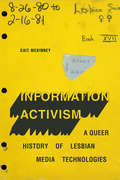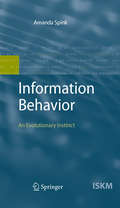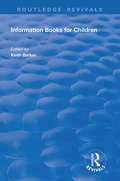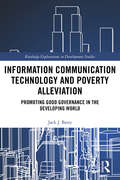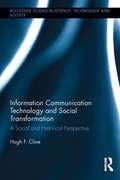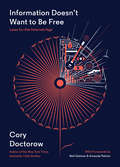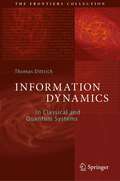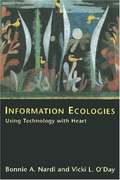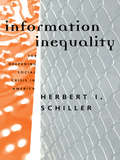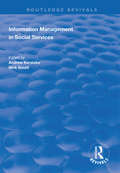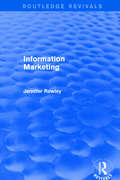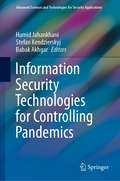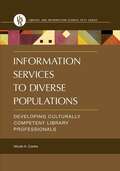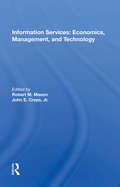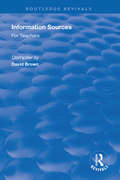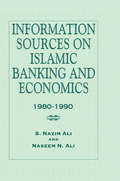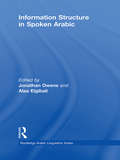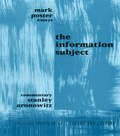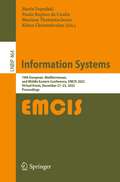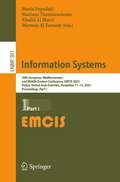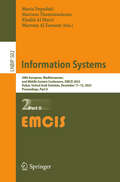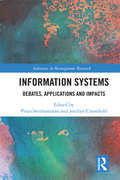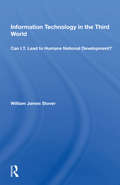- Table View
- List View
Information Activism: A Queer History of Lesbian Media Technologies (Sign, Storage, Transmission)
by Cait McKinneyFor decades, lesbian feminists across the United States and Canada have created information to build movements and survive in a world that doesn't want them. In Information Activism Cait McKinney traces how these women developed communication networks, databases, and digital archives that formed the foundation for their work. Often learning on the fly and using everything from index cards to computers, these activists brought people and their visions of justice together to organize, store, and provide access to information. Focusing on the transition from paper to digital-based archival techniques from the 1970s to the present, McKinney shows how media technologies animate the collective and unspectacular labor that sustains social movements, including their antiracist and trans-inclusive endeavors. By bringing sexuality studies to bear on media history, McKinney demonstrates how groups with precarious access to control over information create their own innovative and resourceful techniques for generating and sharing knowledge.
Information Behavior
by Amanda SpinkInformation behavior has emerged as an important aspect of human life, however our knowledge and understanding of it is incomplete and underdeveloped scientifically. Research on the topic is largely contemporary in focus and has generally not incorporated results from other disciplines. In this monograph Spink provides a new understanding of information behavior by incorporating related findings, theories and models from social sciences, psychology and cognition. In her presentation, she argues that information behavior is an important instinctive sociocognitive ability that can only be fully understood with a highly interdisciplinary approach. The leitmotivs of her examination are three important research questions: First, what is the evolutionary, biological and developmental nature of information behavior? Second, what is the role of instinct versus environment in shaping information behavior? And, third, how have information behavior capabilities evolved and developed over time? Written for researchers in information science as well as social and cognitive sciences, Spink's controversial text lays the foundation for a new interdisciplinary theoretical perspective on information behavior that will not only provide a more holistic framework for this field but will also impact those sciences, and thus also open up many new research directions.
Information Books for Children (Routledge Revivals)
by Keith BarkerFirst published in 1992, this book will be an invaluable help to librarians, teachers and parents looking for quality information books for children. Four Hundred and Seventy titles have been selected by an experienced team of reviewers for young people between the ages 3 and 16. Written by teachers and librarians, each review includes full bibliographical details, a succinct assessment of the book and an indication of reader age range. The subjects covered take into account the requirements of the National Curriculum. All areas of knowledge are covered, but no attempt was made to find recommended titles in all subjects – the quality of the book with a specific topic, author or title in mind, detailed subject and author/title indexes are supplied.
Information Communication Technology and Poverty Alleviation: Promoting Good Governance in the Developing World (Routledge Explorations in Development Studies)
by Jack J. BarryDespite global economic disparities, recent years have seen rapid technological changes in developing countries, as it is now common to see people across all levels of society with smartphones in their hands and computers in their homes. However, does access to Information Communication Technologies (ICTs) actually improve the day-to-day lives of low-income citizens? This book argues that access to the internet can help alleviate poverty, improve development outcomes, and is now vital for realizing many human rights. This book posits that good governance is essential to the realization of inclusive pro-poor development goals, and puts forward policy recommendations that aim to mitigate the complex digital divide by employing governance as the primary actor. In making his argument, the author provides a quantitative analysis of developing countries, conjoined with a targeted in-depth study of Mexico. This mixed method approach provides an intriguing case for how improvements in the quality of governance impacts both ICT penetration, and poverty alleviation. Overall, the book challenges the neoliberal deterministic perspective that the open market will "solve" technology diffusion, and argues instead that good governance is the lynchpin that creates conducive conditions for ICTs to make an impact on poverty alleviation. In fact, the digital divide should not be considered binary, rather it is a multifaceted problem where income, education, and language all need to be considered to address it effectively. This book will be useful for researchers/students of development, communication technologies, and comparative politics as well as for development practitioners and policy makers with an interest in how modern technology is impacting the poor in the developing world.
Information Communication Technology and Social Transformation: A Social and Historical Perspective (Routledge Studies in Science, Technology and Society #25)
by Hugh F. ClineThis book argues that information communication technologies are not creating new forms of social structure, but rather altering long-standing institutions and amplifying existing trends of social change that have their origins in ancient times. Using a comparative historical perspective, it analyzes the applications of information communication technologies in relation to changes in norms and values, education institutions, the socialization of children, new forms of deviant and criminal behaviors, enhanced participation in religious activities, patterns of knowledge creation and use, the expansion of consumerism, and changing experiences of distance and time.
Information Doesn't Want to Be Free
by Neil Gaiman Cory Doctorow Amanda PalmerIn sharply argued, fast-moving chapters, Cory Doctorow's Information Doesn't Want to Be Free takes on the state of copyright and creative success in the digital age. Can small artists still thrive in the Internet era? Can giant record labels avoid alienating their audiences? This is a book about the pitfalls and the opportunities that creative industries (and individuals) are confronting today - about how the old models have failed or found new footing, and about what might soon replace them. An essential read for anyone with a stake in the future of the arts, Information Doesn't Want to Be Free offers a vivid guide to the ways creativity and the Internet interact today, and to what might be coming next.
Information Dynamics: In Classical and Quantum Systems (The Frontiers Collection)
by Thomas DittrichThis wide-ranging book introduces information as a key concept not only in physics, from quantum mechanics to thermodynamics, but also in the neighboring sciences and in the humanities. The central part analyzes dynamical processes as manifestations of information flows between microscopic and macroscopic scales and between systems and their environment. Quantum mechanics is interpreted as a reconstruction of mechanics based on fundamental limitations of information processing on the smallest scales. These become particularly manifest in quantum chaos and in quantum computing. Covering subjects such as causality, prediction, undecidability, chaos, and quantum randomness, the book also provides an information-theoretical view of predictability. More than 180 illustrations visualize the concepts and arguments. The book takes inspiration from the author's graduate-level topical lecture but is also well suited for undergraduate studies and is a valuable resource for researchers and professionals.
Information Ecologies: Using Technology With Heart
by Bonnie A. Nardi Vicki O'DayThe common rhetoric about technology falls into two extreme categories: uncritical acceptance or blanket rejection. Claiming a middle ground, Bonnie Nardi and Vicki O'Day call for responsible, informed engagement with technology in local settings, which they call information ecologies. An information ecology is a system of people, practices, technologies, and values in a local environment. Nardi and O'Day encourage the reader to become more aware of the ways people and technology are interrelated. They draw on their empirical research in offices, libraries, schools, and hospitals to show how people can engage their own values and commitments while using technology.
Information Fantasies: Precarious Mediation in Postsocialist China
by Xiao LiuWinner of the Science Fiction Research Association Book AwardA groundbreaking, alternate history of information technology and information discourses Although the scale of the information economy and the impact of digital media on social life in China today could pale that of any other country, the story of their emergence in the post-Mao sociopolitical environment remains untold. Information Fantasies offers a revisionist account of the emergence of the &“information society,&” arguing that it was not determined by the technology of digitization alone but developed out of a set of techno-cultural imaginations and practices that arrived alongside postsocialism.Anticipating discussions on information surveillance, data collection, and precarious labor conditions today, Xiao Liu goes far beyond the current scholarship on internet and digital culture in China, questioning the limits of current new-media theory and history, while also salvaging postsocialism from the persistent Cold War structure of knowledge production.Ranging over forgotten science fiction, unjustly neglected films, corporeal practices such as qigong, scientific journals, advertising, and cybernetic theories, Information Fantasies constructs an alternate genealogy of digital and information imaginaries—one that will change how we look at the development of the postsocialist world and the emergence of digital technologies.
Information Inequality
by Herbert SchillerHerbert Schiller, long one of America's leading critics of the communications industry, here offers a salvo in the battle over information. In Information Inequality he explains how privatization and the corporate economy directly affect our most highly prized democratic institutions: schools and libraries, media, and political culture. A master media-watcher, Schiller presents a crisp and far-reaching indictment of the "data deprivation" corporate interests are inflicting on the social fabric.
Information Management in Social Services: Volume 2: Information Management In Social Services (Routledge Revivals)
by Nick Gould Andrew KerslakeFirst published in 1996, this volume explores the role of IT in the social services sector and provides solutions to problems of information flow and management, with contributors and researchers experienced in statistics, planning and policy for social services. Its publication marked a rite of passage for social services informatics. Articles contained in this volume confront the potentialities and risks of the internet technological frontier, bringing in areas including the voluntary sector, SSI inspections and how readers employed in social services can benefit from information technology.
Information Marketing
by Jennifer RowleyThis title was first published in 2001. Technology-led developments are changing the nature of the information marketplace. In the face of rapid change, stakeholders and players in the marketplace need to form new strategic alliances, identify new market segments, evolve new products, and, in general, manage changing relationships between suppliers and customers. This work focuses on "information marketing" - the marketing of information based products and services. It studies marketing in contexts and organizations in which information based products and services are a significant product category. Typical information based products include: books, CD's, videos, journals, journal articles, and databases and typical information based services include: libraries, business consultancy services, and web-based information services. Chapters explore concepts such as the structure of the information marketplace, relationships with customers, marketing communications, and marketing planning and strategy.
Information Politics, Protests, and Human Rights in the Digital Age
by Mahmood MonshipouriWe live in a highly complex and evolving world that requires a fuller and deeper understanding of how modern technological tools, ideas, practices, and institutions interact, and how different societies adjust themselves to emerging realities of the digital age. This book conveys such issues with a fresh perspective and in a systematic and coherent way. While many studies have explained in depth the change in the aftermath of the unrests and uprisings throughout the world, they rarely mentioned the need for constructing new human rights norms and standards. This edited collection provides a balanced conceptual framework to demonstrate not only the power of autonomous communication networks but also their limits and the increasing setbacks they encounter in different contexts.
Information Security Technologies for Controlling Pandemics (Advanced Sciences and Technologies for Security Applications)
by Babak Akhgar Hamid Jahankhani Stefan KendzierskyjThe year 2020 and the COVID-19 pandemic marked a huge change globally, both in working and home environments. They posed major challenges for organisations around the world, which were forced to use technological tools to help employees work remotely, while in self-isolation and/or total lockdown. Though the positive outcomes of using these technologies are clear, doing so also comes with its fair share of potential issues, including risks regarding data and its use, such as privacy, transparency, exploitation and ownership. COVID-19 also led to a certain amount of paranoia, and the widespread uncertainty and fear of change represented a golden opportunity for threat actors. This book discusses and explains innovative technologies such as blockchain and methods to defend from Advanced Persistent Threats (APTs), some of the key legal and ethical data challenges to data privacy and security presented by the COVID-19 pandemic, and their potential consequences. It then turns to improved decision making in cyber security, also known as cyber situational awareness, by analysing security events and comparing data mining techniques, specifically classification techniques, when applied to cyber security data. In addition, the book illustrates the importance of cyber security, particularly information integrity and surveillance, in dealing with an on-going, infectious crisis. Aspects addressed range from the spread of misinformation, which can lead people to actively work against measures designed to ensure public safety and minimise the spread of the virus, to concerns over the approaches taken to monitor, track, trace and isolate infectious cases through the use of technology. In closing, the book considers the legal, social and ethical cyber and information security implications of the pandemic and responses to it from the perspectives of confidentiality, integrity and availability.
Information Services To Diverse Populations: Developing Culturally Competent Library Professionals (Library And Information Science Text Series)
by Nicole A. CookeFilling a gap in the existing library and information science literature, this book consolidates recent research and best practices to address the need for diversity and social justice in the training and education of LIS professionals. The development of cultural competency skills and social awareness benefits LIS students, their future employers, and the library profession at large―not to mention library customers and society as a whole. This textbook and comprehensive resource introduces students to the contexts and situations that promote the development of empathy and build cultural competence, examines the research in the areas of diversity and social justice in librarianship, explains how social responsibility is a foundational value of librarianship, and identifies potential employment and networking opportunities related to diversity and social justice in librarianship. A valuable book for students in graduate library and information science programs as well as LIS practitioners and researchers interested in knowing more about the topic of diversity in the profession, Information Services to Diverse Populations: Developing Culturally Competent Library Professionals addresses the political, social, economic, and technological divides among library patrons, covers transformative library services, and discusses outreach and services to diverse populations as well as how to evaluate such services, among many other topics. Appendices containing suggestions for exercises and assignments as well as lists of related library organizations and readings in related literature provide readers with additional resources.
Information Services: Economics, Management, And Technology
by Robert M. Mason John E. CrepsAs information service management becomes increasingly critical in the 1980s, its attention is no longer limited to the acquisition, indexing, and storage of documents. Instead, it is taking on an expanded role in the understanding and analysis of economic issues and the management of technological innovation, This collection defines the dimensions of this expanded role and suggests strategies for improved information service management. Three principal areas related to information policy and decision making are covered: economics and government policy, management and marketing of services, and innovations and the impacts of technology. The book provides a practical and comprehensive background and framework for librarians, students of information science, information center managers, and others who are concerned with effective management of information services.
Information Sources for Teachers (Routledge Revivals)
by David BrownPublished in 1996, this book aims to address the problem faced by teachers needing basic information about the subject they have been asked to teach. It includes addresses of publishers, suppliers, agencies and organizations which should be useful for teachers.
Information Sources on Islamic Banking and Economics: 1980-1990
by S. Nazim Ali Naseem N. AliIslamic banking and economics (IBE) is a fast-growing subject of vital interest in both East and West as Muslims change their attitudes towards investments and find ways to invest their funds according to the Islamic faith. Along with the rapid developments in Islamic banking there has been a concomitant increase in the quantity of relevant IBE mat
Information Structure in Spoken Arabic (Routledge Arabic Linguistics Series)
by Jonathan OwensThis book explores speakers’ intentions, and the structural and pragmatic resources they employ, in spoken Arabic – which is different in many essential respects from literary Arabic. Based on new empirical findings from across the Arabic world this book elucidates the many ways in which context and the goals and intentions of the speaker inform and constrain linguistic structure in spoken Arabic. This is the first book to provide an in-depth analysis of information structure in spoken Arabic, which is based on language as it is actually used, not on normatively-given grammar. Written by leading experts in Arabic linguistics, the studies evaluate the ways in which relevant parts of a message in spoken Arabic are encoded, highlighted or obscured. It covers a broad range of issues from across the Arabic-speaking world, including the discourse-sensitive properties of word order variation, the use of intonation for information focussing, the differential role of native Arabic and second languages to encode information in a codeswitching context, and the need for cultural contextualization to understand the role of "disinformation" structure. The studies combine a strong empirical basis with methodological and theoretical issues drawn from a number of different perspectives including pragmatic theory, language contact, instrumental prosodic analysis and (de-)grammaticalization theory. The introductory chapter embeds the project within the deeper Arabic grammatical tradition, as elaborated by the eleventh century grammarian Abdul Qahir al-Jurjani. This book provides an invaluable comprehensive introduction to an important, yet understudied, component of spoken Arabic.
Information Subject: Countering The Waves Of Identity Politics (Critical Voices in Art, Theory and Culture)
by Stanley Aronowitz Mark PosterFirst Published in 2001. In this collection of essays and interviews, Mark Poster examines theoretical approaches and develops his own position on our information based society. He contends that new communications media disrupt and transfigure the way identities are constituted in cultural exchanges. He looks in detail at several aspects of what might be called "internet culture", including virtuality and democracy.Poster advocates an awareness of the Internet and other new forms of communication, calling for a mobilization to ensure accessibility to all and to configure technology into vehicles of open cultural creation. For example, nothing is pure about the Internet politically, he points out, and it remains an open question as to who will transform the potentiality of new communications media into determinate cultural configurations. This book explores the rupture and potentiality between the electronic self and the face-to-face self inherent in new forms of technology and media.
Information Systems: 19th European, Mediterranean, and Middle Eastern Conference, EMCIS 2022, Virtual Event, December 21–22, 2022, Proceedings (Lecture Notes in Business Information Processing #464)
by Paulo Rupino da Cunha Marinos Themistocleous Maria Papadaki Klitos ChristodoulouThis book constitutes selected papers from the 19th European, Mediterranean, and Middle Eastern Conference, EMCIS 2022, which was held virtually during December 7-8, 2022.EMCIS covers technical, organizational, business, and social issues in the application of information technology and is dedicated to the definition and establishment of Information Systems (IS) as a discipline of high impact for IS professionals and practitioners. It focuses on approaches that facilitate the identification of innovative research of significant relevance to the IS discipline following sound research methodologies that lead to results of measurable impact. The 47 papers presented in this volume were carefully reviewed and selected from a total of 136 submissions. They were organized in topical sections named: Artificial intelligence; big data and analytics; blockchain technology and applications; cloud computing; digital governance; digital services and social media; emerging computing technologies and trends for business process management; enterprise systems; information system security and information privacy protection; innovative research projects; IT governance and alignment; management and organizational issues in information systems; and metaverse.
Information Systems: 20th European, Mediterranean, and Middle Eastern Conference, EMCIS 2023, Dubai, United Arab Emirates, December 11-12, 2023, Proceedings, Part I (Lecture Notes in Business Information Processing #501)
by Marinos Themistocleous Khalid Al Marri Maria Papadaki Marwan Al ZarouniThis book constitutes selected papers from the 20th European, Mediterranean, and Middle Eastern Conference, EMCIS 2023, which was held in Dubai, UAE, during December 11-12, 2023. EMCIS covers technical, organizational, business, and social issues in the application of information technology and is dedicated to the definition and establishment of Information Systems (IS) as a discipline of high impact for IS professionals and practitioners. It focuses on approaches that facilitate the identification of innovative research of significant relevance to the IS discipline following sound research methodologies that lead to results of measurable impact. The 43 papers presented in this volume were carefully reviewed and selected from a total of 126 submissions. They were organized in topical sections as follows: Part I: Metaverse; blockchain technology and applications; digital governance; healthcare information systems; artificial intelligence; Part II: Big data and analytics; digital services and social media; innovative research projects; managing information systems; smart cities.
Information Systems: 20th European, Mediterranean, and Middle Eastern Conference, EMCIS 2023, Dubai, United Arab Emirates, December 11-12, 2023, Proceedings, Part II (Lecture Notes in Business Information Processing #502)
by Marinos Themistocleous Khalid Al Marri Maria Papadaki Marwan Al ZarouniThis book constitutes selected papers from the 20th European, Mediterranean, and Middle Eastern Conference, EMCIS 2023, which was held in Dubai, UAE, during December 11-12, 2023. EMCIS covers technical, organizational, business, and social issues in the application of information technology and is dedicated to the definition and establishment of Information Systems (IS) as a discipline of high impact for IS professionals and practitioners. It focuses on approaches that facilitate the identification of innovative research of significant relevance to the IS discipline following sound research methodologies that lead to results of measurable impact. The 43 papers presented in this volume were carefully reviewed and selected from a total of 126 submissions. They were organized in topical sections as follows: Part I: Metaverse; blockchain technology and applications; digital governance; healthcare information systems; artificial intelligence; Part II: Big data and analytics; digital services and social media; innovative research projects; managing information systems; smart cities.
Information Systems: Debates, Applications and Impacts
by Jocelyn Cranefield Priya SeetharamanThis book captures a range of important developments that have occurred in Information Systems over the last forty years, with a particular focus on India and the developing world. Over this time, Information and Communications Technology (ICT) and Information Systems (IS) have come to play a critical role in supporting, complementing and automating managerial decisions, shaping and transforming industries, and contributing to deep societal and economic change. This volume examines a range of topics for those interested in the adoption and use of these technologies across varied situations. It combines empirical studies on the application and impact of IS with commentaries, debates and insights on the transformative role that IT and the IT industry have played, and continue to play, within India as well as globally. The book draws attention to issues and challenges that organizations grapple with in tech-enabled environments, and provides insights on the role of automation and computational techniques. It explores the global impact of the technology revolution on economic growth and development, electronic globalization, and the wider opportunities and challenges of a hi-tech world. The chapters cover various themes such as e-government in India, internet-based distribution systems, internet banking, and use of collaborative IT tools and functions to support virtual teams in the software industry and the business process outsourcing industry. Other chapters focus on methodological advances, such as systems thinking which finds applications in organizational decision-making, and the use of fuzzy logic. This volume will interest professionals and scholars of information technology and information systems, computer studies, IT systems, economics, and business and management studies.
Information Technology In The Third World: Can I.T. Lead To Humane National Development?
by William James StoverMass media, telecommunications, and computer technology can effect change in poor countries, but Third World leaders are often disappointed in the results. Professor Stover looks closely at information technology and communication as agents of economic, social, and political development in Third World countries, stressing that definitions of "communication" and "development" must include participation in the exchange of information and the attainment of humane values. He examines reasons why the current world information order does not meet the needs of the Third World and argues that the major difficulty in achieving the potential of information technology for humane development is a cyclical pattern involving technology and values. When countries acquire the physical means of communication, their leaders are tempted to control them, resulting in censorship that prevents genuine communication. Breaking this cycle is a major requirement in using information technology for development, and Dr. Stover discusses how this may be accomplished practically in developmental, Western, and Soviet contexts.
